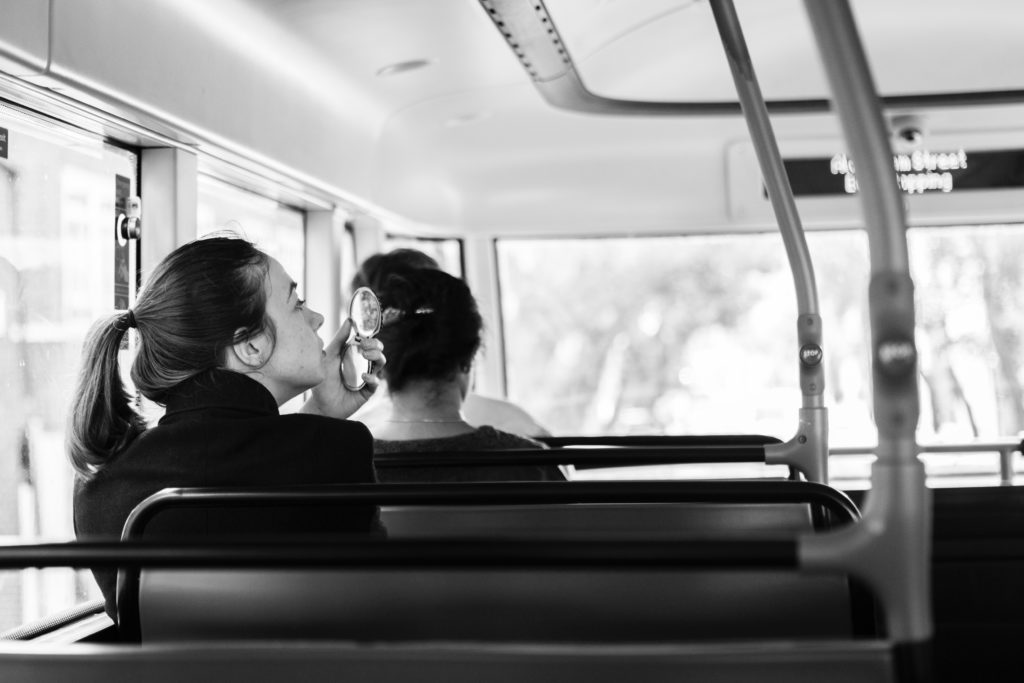I’m sorry, but this is another story about a crazy girl – I know, been there done that, Sylvia Plath has already written those stories and at least had the decency to do what I could never hope to accomplish. When I read her, my darling Sylvia, I felt that we were made of the same flesh, both blonde, both too smart – that’s what my therapist keeps saying, that my intelligence won’t help me heal, that I’ve held my intelligence at arm’s length all my life like a rampart between me and the days, that I need to let it go to get in touch with what I feel. She tells me that repressing my emotions the way I do only makes me want to die, she tells me that obviously when the bell jar cracks and lets out what I’m holding in, my feelings explode, short-circuit, and make me want to end it all. I need to learn to get closer to what I feel – and books, even if they trace the pattern of my feelings, are external objects. I need to close them so I can learn to live. I guess one day you have to stop crying for the dead along with yourself. I guess you need to cry all by yourself. Reading Sylvia cradles me and gives shape to my days, but I won’t turn on the oven and I won’t let the gas slowly fill my lungs. I don’t know if you can survive the violent deaths of the writers you love, but I don’t think I have the strength to repeat history. I have to close the books. Leave literature altogether.
To avoid ending up like Sylvia and Nelly, I heal myself three times a week with visits to the therapist; yes, I’m crazy, but maybe one day I won’t be, that’s my foolish wish. I would have liked for my mothers to help me instead of hurt me. It’s just that, to be sure that I don’t get lost along the way, they’ve placed a trail of little pebbles to lead me to the abyss – but what do you want from me, I’m crazy, I want to break this curse, I want to live, so I go to Rivière-des-Prairies, even if it’s a trek. First, I walk fifteen minutes to catch the 139 that goes up Pie-IX to Henribou, then from Henribou I take the 48 Perras and once I get on, I have another half-hour bus ride to stare out the window at all the ugliness of Montréal-Nord. And it isn’t by looking at all that gloom and the bankrupt-looking shops that I find the will to belong in the outside world. It isn’t by looking out the bus window that I find the will to live, period. Every time I get on, I put my hands on the edge of my seat, I grip it, because I’m taken with the idea of opening the window, breathing in the city air one last time, and answering my mothers’ call by throwing myself from the moving vehicle, praying that a car crushes my body. I imagine my body crushed into a pulp and I feel joy; but since above all I want to be in charge of myself, I want to be my own mother, I dig my nails into the blue vinyl and I try to think of something else, fix my attention on anything but the paths paved by two women who killed themselves.
Nothing distinguishes me from them at first glance, if you aren’t looking for it, if you don’t scratch the surface. Me too, just like them, I have an iPod that plays the same songs, khaki polish on my nails and a nice vintage parka, me too, me too, me too, and soon, maybe, I’ll get the death wish out of my DNA, I’ll pry it out with a crowbar, I’ll get rid of every last bit of Sylvia and Nelly that flows in my veins, I’ll leave it to others, this darkness that envelops me, their beloved darkness.
When I close my eyes, I imagine myself no longer being Nelly and Sylvia’s daughter, I renounce my mothers just as they will renounce me when I start acting like all these girls my age on the bus. I hope that they put an end to this curse, that they disown me once and for all after I’ve stayed on the 48 Perras a stop further than the one I usually get off at. These girls all go to CEGEP just one stop past the hospital – a five-minute walk from the RDP hospital – whereas I get off first, at this stop where there’s nothing but the home of my two mothers and the other crazies. Every time I have to ring the bell to let the driver know I’m getting off there, the girls all look at me, as though I’ve just said, Look at me, I’m not like you, I’m an imposter, go on, look at me. And it’s always the same: I try to focus on something else, on telling myself, Breathe, Coralie, everything is white, there is only white, there is nothing but white. And I get up from my seat, I grab my bag, I try to pretend no one’s staring at me, that they’re nobody. I get off the bus, I cross the parking lot to get to my therapy appointment, I try to forget everything around me, to whisper to myself that everything is white. I tell myself sweet things, that I’m no one’s daughter, that I’ll be the daughter of Whoever I like. I tell myself, There is nothing in your way, Coralie, you are nowhere, there is only white, so pull your shoulders back, there is nothing but light. You are bathing in light, Coralie.
 Québécoise author Chloé Savoie-Bernard was born in Montreal in 1988. She is the author of Royaume Scotchtape (2015, Éditions de l’Hexagone), a collection of poetry, and Des femmes savantes (2016, Tryptique), a collection of short stories. The latter was shortlisted for the 2017 Prix littéraire des collégiens and received an Honourable Mention for the 2017 Prix littéraire Adrienne-Choquette for short fiction. She is currently pursuing doctoral studies in French Literature at the Université de Montréal.
Québécoise author Chloé Savoie-Bernard was born in Montreal in 1988. She is the author of Royaume Scotchtape (2015, Éditions de l’Hexagone), a collection of poetry, and Des femmes savantes (2016, Tryptique), a collection of short stories. The latter was shortlisted for the 2017 Prix littéraire des collégiens and received an Honourable Mention for the 2017 Prix littéraire Adrienne-Choquette for short fiction. She is currently pursuing doctoral studies in French Literature at the Université de Montréal.

 Natalia Hero is a writer and translator from Montreal. Her fiction has appeared in Cosmonauts Avenue, Peach Mag, Metatron’s ÖMËGÄ, and Shabby Doll House. She was recently shortlisted for the 2017 Metatron Prize. In 2017, she translated one of the stories in I Never Talk About It by Véronique Côté and Steve Gagnon (QC Fiction). She is currently pursuing an M.A. in Literary Translation at the University of Ottawa.
Natalia Hero is a writer and translator from Montreal. Her fiction has appeared in Cosmonauts Avenue, Peach Mag, Metatron’s ÖMËGÄ, and Shabby Doll House. She was recently shortlisted for the 2017 Metatron Prize. In 2017, she translated one of the stories in I Never Talk About It by Véronique Côté and Steve Gagnon (QC Fiction). She is currently pursuing an M.A. in Literary Translation at the University of Ottawa.